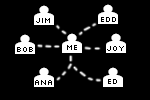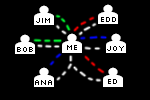Why You Want the Stonehenge of Online Business Networks
 Stonehenge is an amazing structure that was built:
Stonehenge is an amazing structure that was built:
a) to last.
b) to need minimal maintenance.
c) out of a few, simple parts.
d) to be a sophisticated, powerful tool for its creators.
Does that sound like what you want from your network? Then read on.
Have a Plan
 The builders of stonehenge didn’t just take whatever rocks were handy and see what shapes they could make out of them. Nor did they spend all their time gathering every rock they could find. You, like they did, must determine what kind of network you want. This is best determined by asking yourself what you will use your network for. Are you looking for people to collaborate with? People to build business partnerships with? People who can vouch for you? People to connect to each other, with you as the middleman? Whatever your purpose, decide it before you build your network, write it down, and keep it in mind. This helps you focus on the essentials, avoid excessive redundancy, and avoid distractions.
The builders of stonehenge didn’t just take whatever rocks were handy and see what shapes they could make out of them. Nor did they spend all their time gathering every rock they could find. You, like they did, must determine what kind of network you want. This is best determined by asking yourself what you will use your network for. Are you looking for people to collaborate with? People to build business partnerships with? People who can vouch for you? People to connect to each other, with you as the middleman? Whatever your purpose, decide it before you build your network, write it down, and keep it in mind. This helps you focus on the essentials, avoid excessive redundancy, and avoid distractions.
It’s All About the People
 Misleadingly, sites like LinkedIn and Ecademy spend most of the signup process asking about you. But your network is not about you, it’s about the people you have in it. On both a technical level and a practical level, the usefulness of these sites is severly limited by having few or no connections. Later I’ll explain why their usefulness is also limited by having too many connections. But no matter how many connections you have, it’s essential that you choose the best possible people to include in your network. Over the course of your life, you’ve had or will have many colleagues and coworkers. But it doesn’t benefit you to include every person in every organization you’ve been a member of in your network. You should choose people who:
Misleadingly, sites like LinkedIn and Ecademy spend most of the signup process asking about you. But your network is not about you, it’s about the people you have in it. On both a technical level and a practical level, the usefulness of these sites is severly limited by having few or no connections. Later I’ll explain why their usefulness is also limited by having too many connections. But no matter how many connections you have, it’s essential that you choose the best possible people to include in your network. Over the course of your life, you’ve had or will have many colleagues and coworkers. But it doesn’t benefit you to include every person in every organization you’ve been a member of in your network. You should choose people who:
a) Have skills you don’t.
b) You have had significant interaction with. Bare minimum: You’ve had conversations on several occasions.
c) Have earned your trust, and whom you have earned the trust of.
Less is More
 Let’s say you’re amazingly lucky, and almost every person you know meets the requirements listed above. That still doesn’t mean they should all be added. Why not? Because then your network will be redundant, distracting, and high-maintenance. Even if someone has skills that are different than yours, that doesn’t necessarily mean they are useful to network with. “But they *could* be, someday, somehow”, some people say. That’s the attitude that leads to what I call pack-rat networking. The key to avoiding pack-rat networking is to stick to step one: know what you want. Look at your answer for what your network is for, and only add people who contribute to that goal.
Let’s say you’re amazingly lucky, and almost every person you know meets the requirements listed above. That still doesn’t mean they should all be added. Why not? Because then your network will be redundant, distracting, and high-maintenance. Even if someone has skills that are different than yours, that doesn’t necessarily mean they are useful to network with. “But they *could* be, someday, somehow”, some people say. That’s the attitude that leads to what I call pack-rat networking. The key to avoiding pack-rat networking is to stick to step one: know what you want. Look at your answer for what your network is for, and only add people who contribute to that goal.
 Another reason why less is more is because every network needs maintenance. I recommend reading Bob Allards’s excellent ChangeThis manifesto, “The Care and Feeding of Your Network”. The fewer people you have in your network, the less energy it requires to:
Another reason why less is more is because every network needs maintenance. I recommend reading Bob Allards’s excellent ChangeThis manifesto, “The Care and Feeding of Your Network”. The fewer people you have in your network, the less energy it requires to:
a) Stay informed about their lives.
b) Frequently communicate with them.
c) Give and receive assistance from them.
d) Make every interaction personalized.
A network of 50 people is maintainable, understandable, and frequently provides value. A network of 500 people is impersonal, hard to visualize, and infrequently useful.
 You also want to minimize redundancy. Two people who can do the same thing are sometimes okay; there are some people whose skills you need more often than they’re available. People who possess extremely rare skills are good to have two of for a backup if one isn’t available. And people who posess subjective skills, such as design or opinion-based skills, are good to have two of for alternate interpretations and opions. When you’re adding people to your network whose skills are commonly available, you want to choose them based on two factors:
You also want to minimize redundancy. Two people who can do the same thing are sometimes okay; there are some people whose skills you need more often than they’re available. People who possess extremely rare skills are good to have two of for a backup if one isn’t available. And people who posess subjective skills, such as design or opinion-based skills, are good to have two of for alternate interpretations and opions. When you’re adding people to your network whose skills are commonly available, you want to choose them based on two factors:
1) Relative abilility. Choose the people in your network based on how good they are at what they do. If programming isn’t a skill you frequently have need of, don’t add 8 mediocre programmers to your network when you already have 2 with above-average ability. Connect to people who are more able to help you.
2) Closeness to you. You may know the best artist in the world. But if you don’t have a strong professional or personal relationship with them, you’re not likely to receive value from being connected to them, nor are they from you. Connect to people who are more willing to help you.
Established Connections, Effective Networks
 After following the steps above, you will have a purpose-focused network comprised of diverse people who are well-known to you, capable, and willing to help. This may take some time. Few people are able to list all of the people they know and instantly whittle it down to a network of ideal professional connections. This is one of the reasons so many people connect with every person they receive a card from at a conference, feeling that their network is lacking and needs to be filled. It’s much more important to add to your network when you’ve already established a connection offline with a variety of people. This lets you then choose the person you would most benefit from having an online connection with.
After following the steps above, you will have a purpose-focused network comprised of diverse people who are well-known to you, capable, and willing to help. This may take some time. Few people are able to list all of the people they know and instantly whittle it down to a network of ideal professional connections. This is one of the reasons so many people connect with every person they receive a card from at a conference, feeling that their network is lacking and needs to be filled. It’s much more important to add to your network when you’ve already established a connection offline with a variety of people. This lets you then choose the person you would most benefit from having an online connection with.
One of the most important things to remember about online networks is that they’re not just for you. When you build a Stonehenge online business network, you’re building a tool that not only fits all of *your* needs, but that is also better able to serve the people you’re connected to, and the greater online community that you are a part of. By having a network comprised of capable people you know well, you’ve increased your own ability to connect people with others that it will be useful for them to connect to.